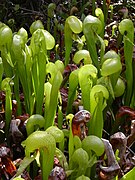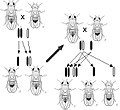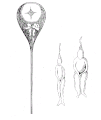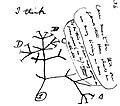Portal:Biology
Introduction


Biology is the scientific study of life. It is a natural science with a broad scope but has several unifying themes that tie it together as a single, coherent field. For instance, all organisms are made up of cells that process hereditary information encoded in genes, which can be transmitted to future generations. Another major theme is evolution, which explains the unity and diversity of life. Energy processing is also important to life as it allows organisms to move, grow, and reproduce. Finally, all organisms are able to regulate their own internal environments.
Biologists are able to study life at multiple levels of organization, from the molecular biology of a cell to the anatomy and physiology of plants and animals, and evolution of populations. Hence, there are multiple subdisciplines within biology, each defined by the nature of their research questions and the tools that they use. Like other scientists, biologists use the scientific method to make observations, pose questions, generate hypotheses, perform experiments, and form conclusions about the world around them.
Life on Earth, which emerged more than 3.7 billion years ago, is immensely diverse. Biologists have sought to study and classify the various forms of life, from prokaryotic organisms such as archaea and bacteria to eukaryotic organisms such as protists, fungi, plants, and animals. These various organisms contribute to the biodiversity of an ecosystem, where they play specialized roles in the cycling of nutrients and energy through their biophysical environment. (Full article...)
Selected article -

Evolutionary thought, the recognition that species change over time and the perceived understanding of how such processes work, has roots in antiquity—in the ideas of the ancient Greeks, Romans, Chinese, Church Fathers as well as in medieval Islamic science. With the beginnings of modern biological taxonomy in the late 17th century, two opposed ideas influenced Western biological thinking: essentialism, the belief that every species has essential characteristics that are unalterable, a concept which had developed from medieval Aristotelian metaphysics, and that fit well with natural theology; and the development of the new anti-Aristotelian approach to modern science: as the Enlightenment progressed, evolutionary cosmology and the mechanical philosophy spread from the physical sciences to natural history. Naturalists began to focus on the variability of species; the emergence of palaeontology with the concept of extinction further undermined static views of nature. In the early 19th century prior to Darwinism, Jean-Baptiste Lamarck (1744–1829) proposed his theory of the transmutation of species, the first fully formed theory of evolution.
In 1858 Charles Darwin and Alfred Russel Wallace published a new evolutionary theory, explained in detail in Darwin's On the Origin of Species (1859). Darwin's theory, originally called descent with modification is known contemporarily as Darwinism or Darwinian theory. Unlike Lamarck, Darwin proposed common descent and a branching tree of life, meaning that two very different species could share a common ancestor. Darwin based his theory on the idea of natural selection: it synthesized a broad range of evidence from animal husbandry, biogeography, geology, morphology, and embryology. Debate over Darwin's work led to the rapid acceptance of the general concept of evolution, but the specific mechanism he proposed, natural selection, was not widely accepted until it was revived by developments in biology that occurred during the 1920s through the 1940s. Before that time most biologists regarded other factors as responsible for evolution. Alternatives to natural selection suggested during "the eclipse of Darwinism" (c. 1880 to 1920) included inheritance of acquired characteristics (neo-Lamarckism), an innate drive for change (orthogenesis), and sudden large mutations (saltationism). Mendelian genetics, a series of 19th-century experiments with pea plant variations rediscovered in 1900, was integrated with natural selection by Ronald Fisher, J. B. S. Haldane, and Sewall Wright during the 1910s to 1930s, and resulted in the founding of the new discipline of population genetics. During the 1930s and 1940s population genetics became integrated with other biological fields, resulting in a widely applicable theory of evolution that encompassed much of biology—the modern synthesis. (Full article...)
Selected picture -

Major topics
Selected biography -
Thomas Henry Huxley (4 May 1825 – 29 June 1895) was an English biologist and anthropologist who specialized in comparative anatomy. He has become known as "Darwin's Bulldog" for his advocacy of Charles Darwin's theory of evolution.
The stories regarding Huxley's famous 1860 Oxford evolution debate with Samuel Wilberforce were a key moment in the wider acceptance of evolution and in his own career, although some historians think that the surviving story of the debate is a later fabrication. Huxley had been planning to leave Oxford on the previous day, but, after an encounter with Robert Chambers, the author of Vestiges, he changed his mind and decided to join the debate. Wilberforce was coached by Richard Owen, against whom Huxley also debated about whether humans were closely related to apes. (Full article...)
General images -
Did you know -

- ... that the p19 protein (dimer pictured) evolved in an arms race between plants and viruses?
- ...that there are about a million nephrons in a human kidney?
- ... that the semi-aquatic grasshopper Cornops aquaticum is being trialled in South Africa as a biological control agent for the invasive water hyacinth?
Things you can do
Related portals
Biology portals
Categories

Anatomy - Anthropology - Astrobiology - Biochemistry - Bioengineering - Bioinformatics - Biotechnology - Botany - Cell biology - Conservation biology - Developmental biology - Ecology - Environmental science - Evolutionary biology - Genetics - Mathematical biology - Medicine - Microbiology - Immunology - Molecular biology - Mycology - Neuroscience - Paleontology - Palynology Parasitology - Pharmacology -
Phylogenetics - Physiology - Systems biology - Taxonomy - Toxicology - Virology - ZoologyMore topics
WikiProjects

WikiProjects connected with biology:
A complete list of scientific WikiProjects can be found here. See also Wikispecies, a Wikimedia project dedicated to classification of biological species.
Associated Wikimedia
The following Wikimedia Foundation sister projects provide more on this subject:
-
Commons
Free media repository -
Wikibooks
Free textbooks and manuals -
Wikidata
Free knowledge base -
Wikinews
Free-content news -
Wikiquote
Collection of quotations -
Wikisource
Free-content library -
Wikiversity
Free learning tools -
Wiktionary
Dictionary and thesaurus


























































